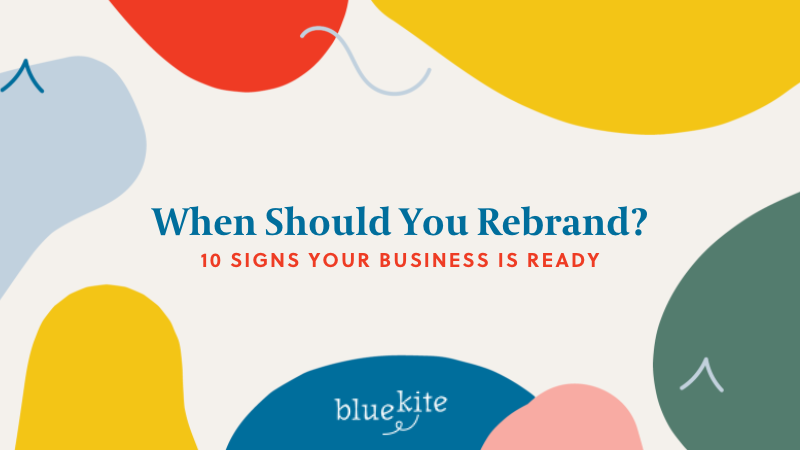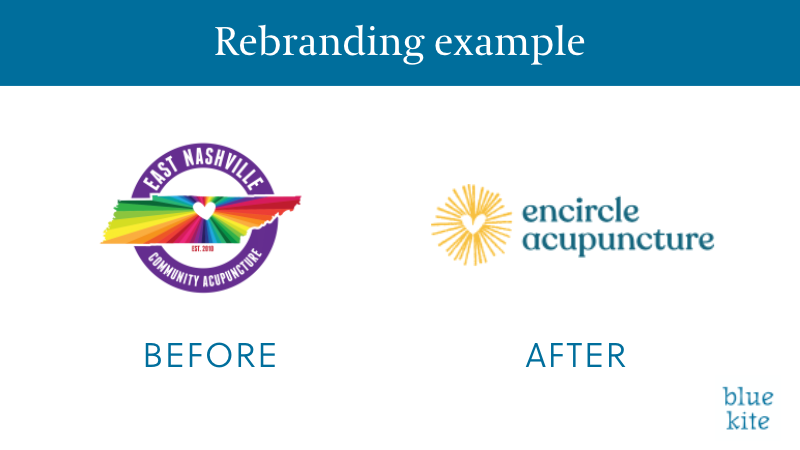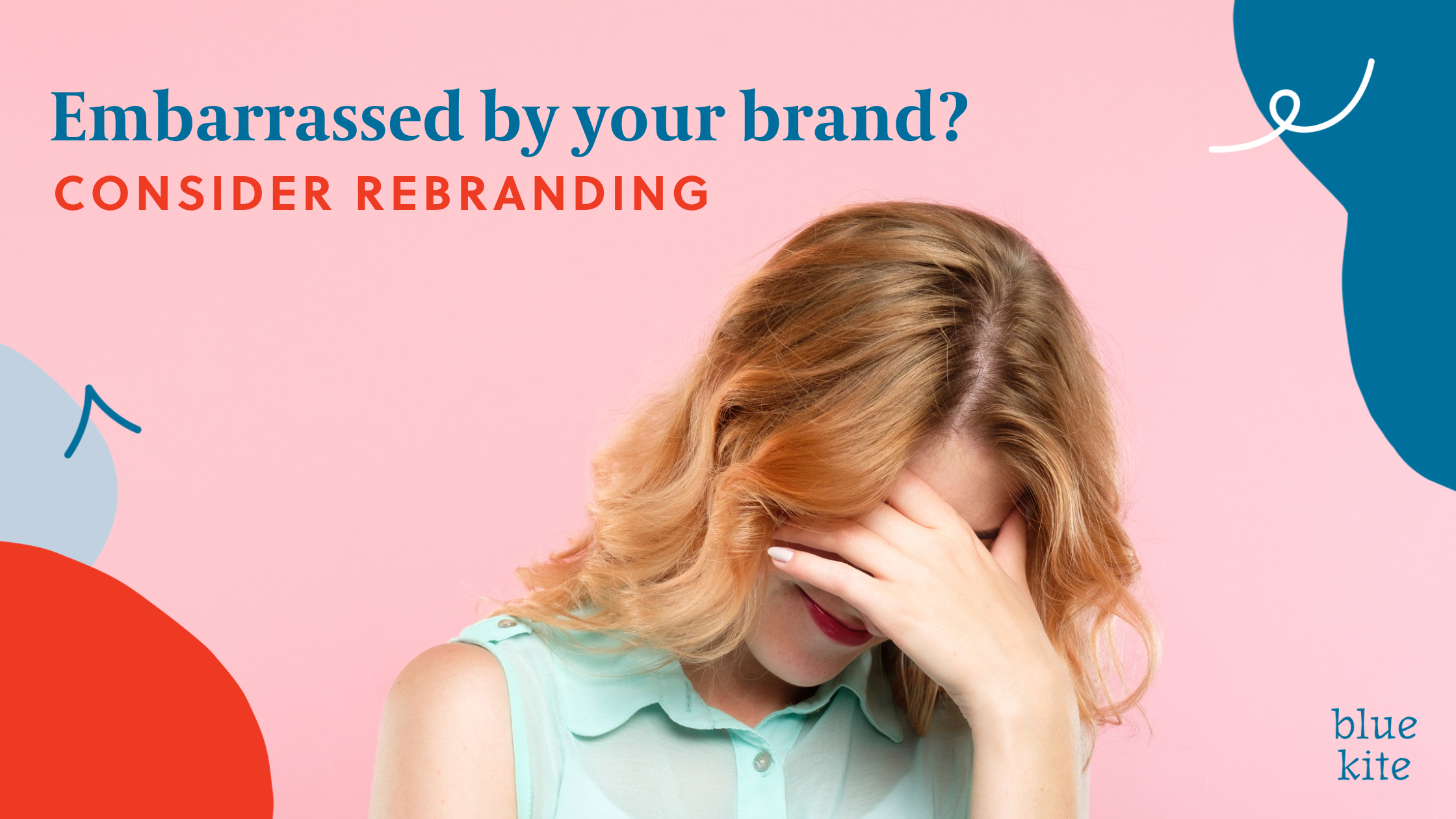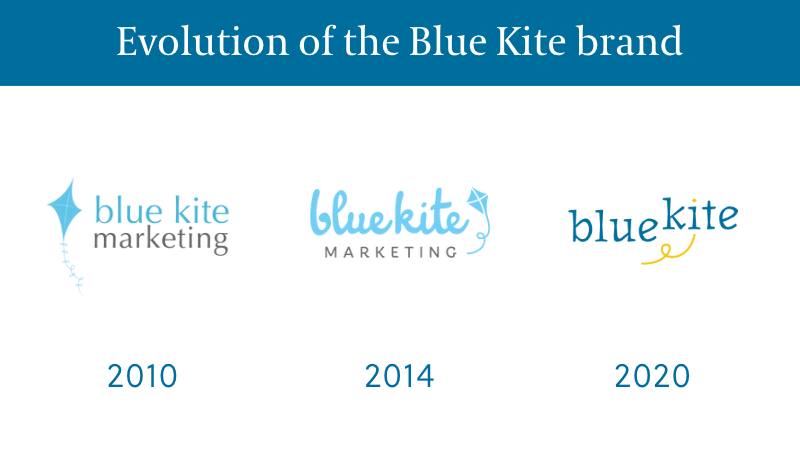When should you rebrand your business?
Whether you’ve simply grown tired of your logo or you’re running into hurdles with your existing branding, this is a question that nearly every company faces at some point––especially if you’ve been in business for more than a few years.
And while rebranding can be extremely beneficial in certain situations, it’s not a decision to take lightly. After all, rebranding is an investment of both time and resources.
So before embarking on this effort, you want to make sure that rebranding will be worth it.
What is a Rebrand?
Before we dive into whether you should rebrand your business, let’s talk about what a rebrand is in the first place.
Rebranding is the process of refreshing your company’s brand image.
It can be as subtle as making small updates to your logo, color palette and fonts. Or, it can include sweeping changes, such as entirely new logo design or even a company name change.
The level of rebranding needed will depend on a lot of factors––such as when you last updated your brand and the reason for rebranding in the first place.
Why Should You Rebrand?
There are lots of reasons to rebrand. But ultimately, the goal of rebranding is to better position your company for growth.
Rebranding can help you change the perception of your company––whether that’s to overcome negative opinions, better represent your mission and culture or allow for expansion into new markets.
When done well, strong branding can make your company become the preferred choice for your product or service.
Top 10 Signs It’s Time to Rebrand Your Business
 So how do you know if your business is ready for a rebrand? Is now the right time to rebrand your business?
So how do you know if your business is ready for a rebrand? Is now the right time to rebrand your business?
Here are some top signs your business might be ready to begin the rebranding process.
1. Your overall strategy or vision has changed.
Perhaps the most important reason to rebrand your business is a change in your company’s strategic direction or vision. This could mean you are shifting your business model or changing your product or service offerings.
For instance, if your business name or visual identity showcases a product or service you no longer offer, then your branding needs to change.
In other words, if your brand doesn’t reflect the focus or strategic direction of your business, rebranding your company is critical. You don’t want to send mixed messages about who you are or what you do.
2. You want to attract a new audience.
Your brand should speak to the people you are trying to reach. If your brand is not connecting with them––either because you’ve shifted your target audience or your brand is no longer attractive to them––a rebrand is critical.
This is especially true for younger audiences. For example, what once worked for Gen Xers or Millennials, might not work for Gen Z.
Customer research is critical here. Talk to your existing customers and get feedback. And take the time to understand your target market.
Don’t just make a branding change on a hunch or gut feeling. This should be a well-researched decision so you can build a brand that speaks the language of your target audience.
3. You’re struggling to stand out from competitors.

To win customers, you have to stand out from your competitors. But that’s tough to do if your brand looks and sounds like everyone else.
Sometimes, that happens on purpose. After all, it’s awfully tempting to mimic other successful brands in your industry. And other times, it’s merely a symptom of everyone following the same design trends or branding best practices.
Either way, the more your brand blends in with other businesses, the harder it will be for you to differentiate from the competition.
If customers commonly confuse your business with competitors, that’s a sure sign that it might be time for a rebrand.
And if you’re having trouble differentiating your brand, take our free competitive advantage quiz to identify what makes your business stand out.
4. You are expanding to new markets.
If your company is expanding to a new market, a rebrand may be in order––especially if the name or imagery is tied closely to a specific location.
That was the case with our client, Encircle Acupuncture.
They were expanding to a second location in the Nashville market. However, their former name, East Nashville Community Acupuncture, was focused on a specific part of town. That name wouldn’t work in the new location.
We developed a new name and brand image to help them grow and expand.
 If you are expanding or have plans to do so, make sure your company name and logo will work in your new market. If it doesn’t, a rebrand may be in order.
If you are expanding or have plans to do so, make sure your company name and logo will work in your new market. If it doesn’t, a rebrand may be in order.
5. Your branding feels dated.
Dated branding is perhaps one of the most common reasons companies want to rebrand.
And while this is absolutely a valid reason––especially if your branding hasn’t changed in more than 10 years––it should be carefully considered before you do it.
Sometimes, there’s great affinity for classic branding. And a complete overhaul could be jarring to your clients and customers. (Gap’s rebranding from 12 years ago is a great example of this).
Consider whether your branding is truly dated and needs to be overhauled; or if a more subtle brand refresh is in order.
If you’re not sure, here are some signs your branding might be truly dated:
- It feels old and out of touch
- It doesn’t work well across mediums (print, online, etc.)
- It doesn’t translate well to social media
- You’re embarrassed to hand out your business card
Ultimately, if you’re embarrassed by your brand or you’re simply no longer excited about it, a rebrand could be a helpful tool for your business. Just make sure you take customer feedback into consideration before you do.
6. Your branding is out of touch or offensive.
During the past couple of years, our country has had a reckoning with racial and social inequity. As a result, many businesses have been re-examining whether their branding is offensive and harmful.
For instance, two years ago, Land O Lakes removed the Native American woman from their product packaging. And last year, Aunt Jemima opted to rename and rebrand the company to remove the racist stereotype from their products. Now, Aunt Jemima is Pearl Milling Company.
If your brand name or logo uses offensive language or stereotypes, a rebrand is essential.
7. Your business has outgrown your branding.
What worked when you were a startup may no longer work when you’ve been in business more than 10 years. As your business grows, you may need a more polished brand image.
For instance, here’s the progression of the Blue Kite Brand.
When I was starting out 12 years ago, I had a small budget to hire a designer for my brand. I opted for a designer who was moonlighting from her day job to build my first logo and website.
As my business has grown and evolved, so has my brand. And now, I have a brand that better reflects both the personality and professionalism of my company. The same may be true for your business.
If your business has matured, but your branding hasn’t, a rebrand will help you better position your company in the mind of your customers.
8. Your ownership is changing.
Mergers and acquisitions often require company name changes, or at the very least, an update to the brand imagery to better reflect the merged business.
This is especially important when companies use a person’s name in the branding. If the company’s namesake is no longer involved with the business, a name change and updated brand may be necessary.
9. You want to raise your prices.
Your brand is what the market believes about your business. It’s all about perception.
Without strong, cohesive branding, it can be difficult to charge premium prices. You can command better pricing when your brand image matches your price point.
The right colors, fonts and imagery can help you communicate that your business offers a premium product or service. If you’re having trouble increasing prices, a refreshed brand can reposition your business in the marketplace to charge what you’re worth.
10. Your brand doesn’t reflect your values.
Articulating your brand’s core identity – your mission, vision and values – is critical to a strong brand. However, if your core values have evolved and changed or if this foundational work wasn’t done when your logo was created, it might be time to revisit your branding.
Your branding is the visual representation of what you stand for as a business. If your logo (the outside) doesn’t match your core values (the inside), you’re confusing your audience.
Your core values should be consistent and apparent in your company’s brand. If it’s not, an update is definitely in order.
Where should you start with rebranding?
If you spot any of these signs in your business, a rebrand might be a good choice for your business. However, you shouldn’t head straight to logo design.
Make sure you have a strong brand strategy first. A brand strategy gives you a roadmap for building the desired perception for your business. Essentially, a brand strategy is your game plan for how your business shows up in the world.
Getting this right first is critical to creating a logo and brand identity that stands out. Only after you have a brand strategy in place, should you begin the design process for your rebrand.
A thoughtful brand strategy not only guides the visual identity of your business, but it also gives you powerful, compelling messaging to better communicate what you do. It’s a terrific tool to ensure your entire team is on the same page about the positioning of your company.
Need help with your rebrand?
Our team can help you build a solid brand strategy, develop a new name (if needed) and design a visual identity that helps you stand out and get noticed.
Ready to get started? Let’s have a conversation. Click here to reach out and set up a free discovery call to see if we’re a fit for each other. We’d love to hear from you!






